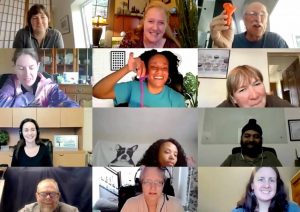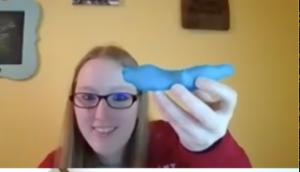Mar 26, 2021 Play Doh Pictionary and Charades Race Online
 Play Doh Pictionary and Charades Race are two of my favorite activities for integrating academic or training content review and reflection with community building and social and emotional learning. Since Zoom has enhanced breakout room capabilities I have been playing both games online with wonderful success. Both strategies afford an opportunity for active, collaborative, engagement with content/vocabulary while giving an opportunity to move around, laugh, and play with a purpose. Play Dough Pictionary works well for concrete concepts like geographic features, parts of a cell, technical equipment review, geometry. Charades Race works well for exploring more abstract concepts such as characters in a book, events, or theoretical ideas, or, to reflect on highlights of a shared experience. Full descriptions of the in-person versions are posted in past issues of the blog: May 2012: Learning Through Play With Play Dough Pictionary: Blending Community Building with Content Review and 2017 Charades Race for Formative Review and Formative Assessment.
Play Doh Pictionary and Charades Race are two of my favorite activities for integrating academic or training content review and reflection with community building and social and emotional learning. Since Zoom has enhanced breakout room capabilities I have been playing both games online with wonderful success. Both strategies afford an opportunity for active, collaborative, engagement with content/vocabulary while giving an opportunity to move around, laugh, and play with a purpose. Play Dough Pictionary works well for concrete concepts like geographic features, parts of a cell, technical equipment review, geometry. Charades Race works well for exploring more abstract concepts such as characters in a book, events, or theoretical ideas, or, to reflect on highlights of a shared experience. Full descriptions of the in-person versions are posted in past issues of the blog: May 2012: Learning Through Play With Play Dough Pictionary: Blending Community Building with Content Review and 2017 Charades Race for Formative Review and Formative Assessment.
Adapting Interactive Games to Online Experiences:
- Charades involves no props so is possible to do with any group. I use play dough pictionary with ongoing groups, or groups I am able to communicate with prior to the session to ask if they can bring clay or Play Doh. Only a few people in the group need to have it in hand to make the game work, the rest can be guessers.
- To adapt these and other active team activities on Zoom I use the choice-centered breakout room function to create teams (see March 8th Post on Choice-Centered Breakout Rooms).
- In Zoom, The leader/facilitator/teacher stays in the main room with the vocabulary or reflection words ready to go. In Google Meet and other platforms that don’t have the capability to move in and out of breakout rooms, the facilitator can message the word to the sculptor/actor.
- The breakout room teams decide who is going to go first and send that person to the main room to get the word. In the case of the Play Dough Pictionary they go back and sculpt the word while their teammates guess it. The first team to guess wins that round.
- I always encourage the sculptor to save their sculpture so we can show it off in the main room.
- In the case of Charades Race, I play it as a relay. When the team guesses the first term, they send the next actor back to the main room to get the next term until the group works through the list of terms (see full write up). You could play either of these activities as a relay. The possibilities and adaptations are endless!
- In Charades race the “team planning” aspect of the game is a valuable part of the content review. See article/full write up here on the blog or in the Inspired Educator, Inspired Learner book.
- Enhance learning and ownership by giving participants the opportunity to lead the game. Ask if there are participants in the group who feel like they have enough knowledge of the concepts to come up with a review list for the game. This works best played in a second round when they understand the game.
 Educators are often surprised by who volunteers and find out through the game who has mastery of the content, it is not always the usual “hand raiser” who actively engages in leading these active review games-, their is magic in the power of play for encouraging involvement and a non-traditional way to show knowledge of content which is why this is one of my favorite formative assessment and academic review strategies.
Educators are often surprised by who volunteers and find out through the game who has mastery of the content, it is not always the usual “hand raiser” who actively engages in leading these active review games-, their is magic in the power of play for encouraging involvement and a non-traditional way to show knowledge of content which is why this is one of my favorite formative assessment and academic review strategies.
References:
April 2017 Inspired Educator Blog Charades Race for Formative Review and Formative Assessment.
Karl Rohnke who credits his co-author of Quicksilver Steve Butler for inventing the “Fast Foods, Electrical Appliances, and Comic Book Heroes” pantomime game.
Rohnke, Karl; Butler, Steve (1995) Quicksilver. Dubuque, IA: Kendall Hunt Publishing.
Stanchfield, Jennifer (2007 and 2016) Tips and Tools for the Art of Experiential Group Facilitation. OKC, OK: Wood ‘N’ Barnes Publishing Co



No Comments